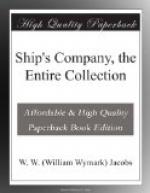Mr. Clarkson hesitated. “Why not choose ’em yourself?” he said at last.
“Just what I told her,” said Mr. Digson, stroking his black beard. “What’ll please you will be sure to please him, I says; and if it don’t it ought to.”
Mr. Clarkson started. “Perhaps you could help her choose,” he said, sharply.
Mr. Digson came down from his perch. “Just what I said,” he replied. “If Mrs. Phipps will let me advise her, I’ll make this house so she won’t know it before I’ve done with it.”
“Mr. Digson has been very kind,” said Mrs. Phipps, reproachfully.
“Not at all, ma’am,” said the builder, softly. “Anything I can do to make you happy or comfortable will be a pleasure to me.”
Mr. Clarkson started again, and an odd idea sent his blood dancing. Digson was a widower; Mrs. Phipps was a widow. Could anything be more suitable or desirable?
“Better let him choose,” he said. “After all, he ought to be a good judge.”
Mrs. Phipps, after a faint protest, gave way, and Mr. Digson, smiling broadly, mounted his perch again.
Mr. Clarkson’s first idea was to consult Mr. Smithson; then he resolved to wait upon events. The idea was fantastic to begin with, but, if things did take such a satisfactory turn, he could not help reflecting that it would not be due to any efforts on the part of Mr. Smithson, and he would no longer be under any testamentary obligations to that enterprising gentleman.
By the end of a week he was jubilant. A child could have told Mr. Digson’s intentions—and Mrs. Phipps was anything but a child. Mr. Clarkson admitted cheerfully that Mr. Digson was a younger and better-looking man than himself—a more suitable match in every way. And, so far as he could judge, Mrs. Phipps seemed to think so. At any rate, she had ceased to make the faintest allusion to any tie between them. He left her one day painting a door, while the attentive Digson guided the brush, and walked homewards smiling.
“Morning!” said a voice behind him.
“Morning, Bignell,” said Mr. Clarkson.
“When—when is it to be?” inquired his friend, walking beside him.
Mr. Clarkson frowned. “When is what to be?” he demanded, disagreeably.
Mr. Bignell lowered his voice. “You’ll lose her if you ain’t careful,” he said. “Mark my words. Can’t you see Digson’s little game?”
Mr. Clarkson shrugged his shoulders.
“He’s after her money,” said the other, with a cautious glance around.
“Money?” said the other, with an astonished laugh. “Why, she hasn’t got any.”
[Illustration: “She’ll be riding in her carriage and pair in six months”]
“Oh, all right,” said Mr. Bignell. “You know best of course. I was just giving you the tip, but if you know better—why, there’s nothing more to be said. She’ll be riding in her carriage and pair in six months, anyhow; the richest woman in Little Molton.”




